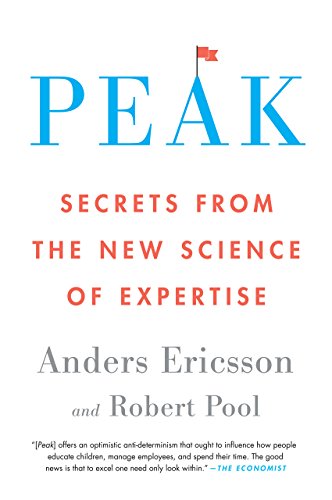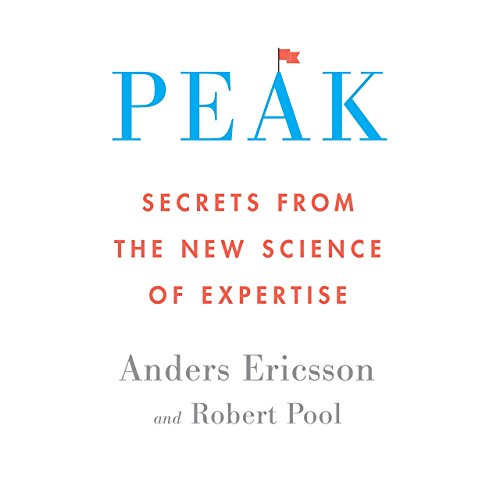“Peak” by Anders Ericsson explores the science behind expertise and how deliberate practice leads to exceptional performance. It emphasizes the importance of focused training.
Anders Ericsson’s “Peak: Secrets from the New Science of Expertise” reveals how anyone can achieve high performance through deliberate practice. The book challenges the notion that talent alone leads to greatness. Ericsson, a renowned psychologist, presents decades of research on expert performance.
He shows that purposeful practice, rather than innate ability, is the key to mastering any skill. Readers learn practical strategies to apply these principles in their own lives. By following the guidelines of deliberate practice, individuals can unlock their potential. “Peak” is a must-read for anyone looking to improve their skills and achieve excellence.

The Essence Of Deliberate Practice
Anders Ericsson’s audiobook “Peak” explores the concept of deliberate practice. This method helps people master skills. Ericsson’s research shows anyone can achieve greatness. It’s not just about talent. It’s about practice.
Ericsson’s Research On Expert Performance
Ericsson studied many experts. He found they all used deliberate practice. This type of practice is different. It’s not just doing the same thing over and over. It’s about pushing your limits.
- Focused on specific goals
- Requires full concentration
- Involves feedback and improvement
Core Principles Behind Deliberate Practice
There are core principles behind deliberate practice. These principles help improve skills. They make practice more effective.
| Principle | Explanation |
|---|---|
| Goal Setting | Set clear, specific goals for improvement. |
| Focused Effort | Practice with full attention and effort. |
| Feedback | Get feedback to correct mistakes. |
| Challenge | Push beyond current abilities. |
Each principle is vital. Without them, practice won’t be as effective. Goal setting helps focus on what to improve. Focused effort ensures you’re giving your best. Feedback corrects mistakes. Challenge pushes you further.

Strategies For Mastery From ‘peak’
Anders Ericsson’s audiobook, Peak, shares powerful strategies for mastering any skill. The book dives into the science of expertise and how anyone can achieve high performance. Here are key strategies from Peak that you can apply to your life.
Setting Well-defined Goals
Having clear goals is essential for mastery. Well-defined goals help track progress. Set specific, measurable, and achievable goals.
- Specific: Know exactly what you want to achieve.
- Measurable: Ensure you can track your progress.
- Achievable: Set realistic but challenging goals.
Breaking down big goals into smaller tasks makes them manageable. This approach helps maintain focus and motivation.
Getting Outside Your Comfort Zone
Growth happens outside your comfort zone. To master a skill, push your limits. Challenge yourself regularly with harder tasks.
Engage in deliberate practice. This means practicing with a purpose. Focus on improving specific aspects of your skill.
- Identify weaknesses.
- Work on these weak areas.
- Track improvements over time.
Consistent effort in challenging tasks leads to progress. Embrace discomfort as part of the learning process.
The Role Of Feedback In Skill Development
Feedback is crucial for skill development. It helps identify areas for improvement. Seek feedback from experts and peers.
| Source | Type of Feedback |
|---|---|
| Experts | Detailed and specific |
| Peers | Encouraging and constructive |
Use feedback to adjust your practice. Make necessary changes to your approach. This cycle of feedback and adjustment accelerates learning.
Remember, mastery is a journey. Stay committed, seek challenges, and use feedback wisely.
Real-world Applications Of ‘peak’
The audiobook “Peak” by Anders Ericsson reveals secrets of expert performance. It focuses on the concept of deliberate practice. This method can enhance skills in many fields. Let’s explore how people apply these principles in real life.
Case Studies Of High Performers
Many top athletes use deliberate practice. They train with specific goals. For example, Michael Phelps swam with detailed feedback. He repeated drills to improve his techniques.
In music, Yo-Yo Ma practiced challenging pieces slowly. He focused on each note. This helped him master complex compositions.
Business leaders also use these principles. Bill Gates read extensively. He learned about diverse topics. This helped him innovate at Microsoft.
Adapting Principles For Personal Growth
Deliberate practice is not just for experts. Anyone can use it to improve. Here’s how you can apply it:
- Set clear goals: Define what you want to achieve.
- Get feedback: Seek advice from a mentor or coach.
- Break tasks down: Focus on small, manageable parts.
- Repeat: Practice regularly with focus.
For example, if you want to cook better, start with simple dishes. Get feedback from friends. Then, try more complex recipes. Repeat this process.
Challenges And Limitations Of Deliberate Practice
Deliberate practice has some challenges. It requires a lot of time. You need patience and persistence. Not everyone has access to expert coaches.
Also, it can be mentally exhausting. You might feel frustrated. It’s important to stay motivated. Find ways to make practice fun.
Another limitation is that it works best for structured activities. Creative fields may find it harder to apply these principles.
In summary, deliberate practice can transform skills. But it demands effort and dedication. Understand its challenges to use it effectively.

Conclusion
Anders Ericsson’s “Peak” audiobook offers valuable insights into mastering skills. It emphasizes deliberate practice and dedication. This audiobook is a must-listen for those seeking personal and professional growth. By applying Ericsson’s principles, you can achieve remarkable success. Embrace the journey of continuous improvement and unlock your full potential.



